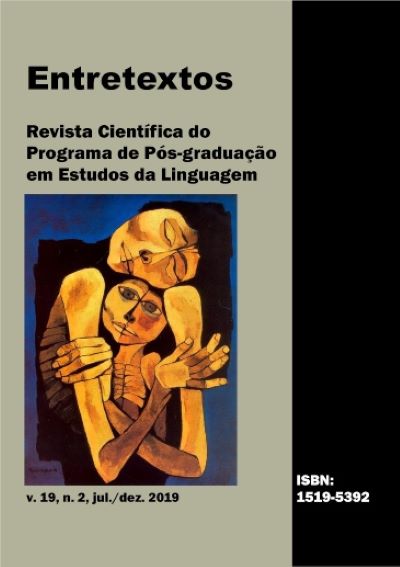General nouns in the writing of Minas Gerais: an analysis of letters to Santa Claus
DOI:
https://doi.org/10.5433/1519-5392.2019v19n2p196Keywords:
General nouns, Letters, Portuguese languageAbstract
This paper analyses the behavior of the general nouns in a corpus composed by letters sent to Santa Claus and contrasts these written language data with previous results from spoken language data. The analysis is based on semantic and sociolinguistic studies about the general nouns and also takes into account the properties of the letters as a textual genre. It is observed quantitative aspects, especially related to the frequency and the relation of those nouns with some indefinite pronouns. By analysing the oral features, as a main result, it is verified that the sender worries about his/her lexical choices and moves away a little from the oral text regarding the use of the general nouns. Considering the age range of the informers, it is observed that children and young people have a slight preference for using uma pessoa (a person) in opposition to the indefinite pronoun alguém (someone).References
AMARAL, Eduardo Tadeu Roque. Estudio contrastivo de nombres generales para humanos en español y en portugués. Lingüística y Literatura, Medellín, CO, n. 72,p. 54-79, 2017.
AMARAL, Eduardo Tadeu Roque; MIHATSCH, Wiltrud. Incipient impersonal pronouns in colloquial Brazilian Portuguese based on 'pessoa', 'pessoal' and 'povo'. Linguistische Berichte, Sonderhefte, v. 26, p. 149-185, 2019.
AMARAL, Eduardo Tadeu Roque; RAMOS, Jânia M. Os nomes gerais no português brasileiro. Belo Horizonte: Faculdade de Letras da UFMG, 2014.
ANTHONY, Laurence. AntConc: a freeware corpus analysis toolkit for concordancing and text analysis. Disponível em:
http://www.antlab.sci.waseda.ac.jp/software.html. Acesso em: 20 jul. 2018.
BEX, Tony. Variety in written English: texts in society: societies in text. London:Routledge, 1996.
CORREIOS. Papai Noel dos correios. Disponível em:
http://www.correios.com.br/sobre- correios/sustentabilidade/vertente-social/papainoel-
dos-correios. Acesso em: 15 out. 2015.
FULGÊNCIO, Lúcia. O problema da interpretação dos elementos anafóricos. 1983.Dissertação (Mestrado em Linguística) – Faculdade de Letras da Universidade Federal de Minas Gerais, Belo Horizonte, 1983.
HALLIDAY, Michael. A. K.; HASAN, Ruqaiya. Cohesion in English. 14. ed. London: Longman, 1995.
HASPELMATH, Martin. Indefinite pronouns. Oxford: Clarendon, 1997. (Oxfordstudies in typology and linguistic theory).
HAVERS, Wilhelm. Handbuch der erklärenden Syntax: ein Versuch zur Erforschung der Bedingungen und Triebkräfte in Syntax und Stilistik. Heidelberg: Carl Winters Universitätsbuchhandlung, 1931.
HEINE, Bernd; KUTEVA, Tania. World lexicon of rammaticalization. Cambridge: Cambridge University Press, 2004.
HEINE, Bernd; SONG, Kyung-an. On the grammaticalization of personal pronouns. Journal of Linguistics, Cambridge, GB, v. 47, n. 3, p. 587-630, 2011.
KLEIBER, Georges. Mais à quoi sert donc le mot chose? Une situation paradoxale. Langue Française, Paris, FR, v. 73, p. 109-128, 1987.
KOCH, Ingedore G. V. Sobre a seleção do núcleo das formas nominais anafóricas na progressão referencial. In: NEGRI, Lígia; FOLTRAN, Maria J.; OLIVEIRA, Roberta P. (org.). Sentido e significação: em torno da obra de Rodolfo Ilari. São Paulo: Contexto, 2004. p. 244-262.
KOCH, Peter; OESTERREICHER, Wulf. Lengua hablada en la Romania: español, francés, italiano. Madrid: Gredos, 2007.
LEHMANN, Christian. Thoughts on grammaticalization. München, NCA: LINCOM Europa, 1995.
MAHLBERG, Michaela. English general nouns: a corpus theoretical approach. Amsterdam: John Benjamins Publishing, 2005.
MARCUSCHI, Luiz Antonio; KOCH, Ingedore G. V. Referenciação. In: JUBRAN, Clélia C. A. S.; KOCH, Ingedore G. V. Gramática do português culto falado no Brasil: construção do texto falado. Campinas: UNICAMP, 2006. v. 1, p. 381-399.
MIHATSCH, Wiltrud. Kognitive Grundlagen lexikalischer Hierarchien: untersucht am Beispiel des Französischen und Spanischen. Tübingen: Max Niemeyer, 2006.
MIHATSCH, Wiltrud. Les noms d’humains généraux aux limites de la grammaticalisation. Syntaxe et Sémantique, Caen, FR, v. 18, p. 67-99, 2017.
OLIVEIRA, Luanna de Sousa do Nascimento. Expressões fixas do português formadas a partir de nomes gerais: aspectos lexicais e variacionistas. 2017. Dissertação (Mestrado em Estudos Linguísticos) - Faculdade de Letras da Universidade Federal de Minas Gerais, Belo Horizonte, 2017.
RAMOS, Jânia M. O surgimento de um nome geral: a lexia trem no dialeto mineiro. In: RAMOS, Jânia M.; COELHO, Sueli M. Português brasileiro dialetal: temas gramaticais. Campinas: Mercado de Letras, 2013. p. 137-147.
SCHERRE, Maria Marta P. Reanálise da concordância nominal em português. 1988. Tese (Doutorado em Linguística) - Faculdade de Letras da Universidade Federal do Rio de Janeiro, Rio de Janeiro, 1988.
SCHNEDECKER, Catherine. Les (noms d’) humains sont-ils à part? Intérêts linguistiques d’une sous-catégorie nominale encore marginale. In: MIHATSCH, Wiltrud; SCHNEDECKER, Catherine. Les noms d’humains: une catégorie à part?Stuttgart: Franz Steiner, 2015. p. 15-53.
Downloads
Published
How to Cite
Issue
Section
License
Entretextos adota a Licença Creative Commons Attribution 4.0 International, portanto, os direitos autorais relativos aos artigos publicados são do(s) autor (es), que cedem à Entretextos o direito de exclusividade de primeira publicação.
Sob essa licença é possível: Compartilhar - copiar e redistribuir o material em qualquer suporte ou formato. Adaptar - remixar, transformar, e criar a partir do material, atribuindo o devido crédito e prover um link para a licença e indicar se mudanças foram feitas.




















